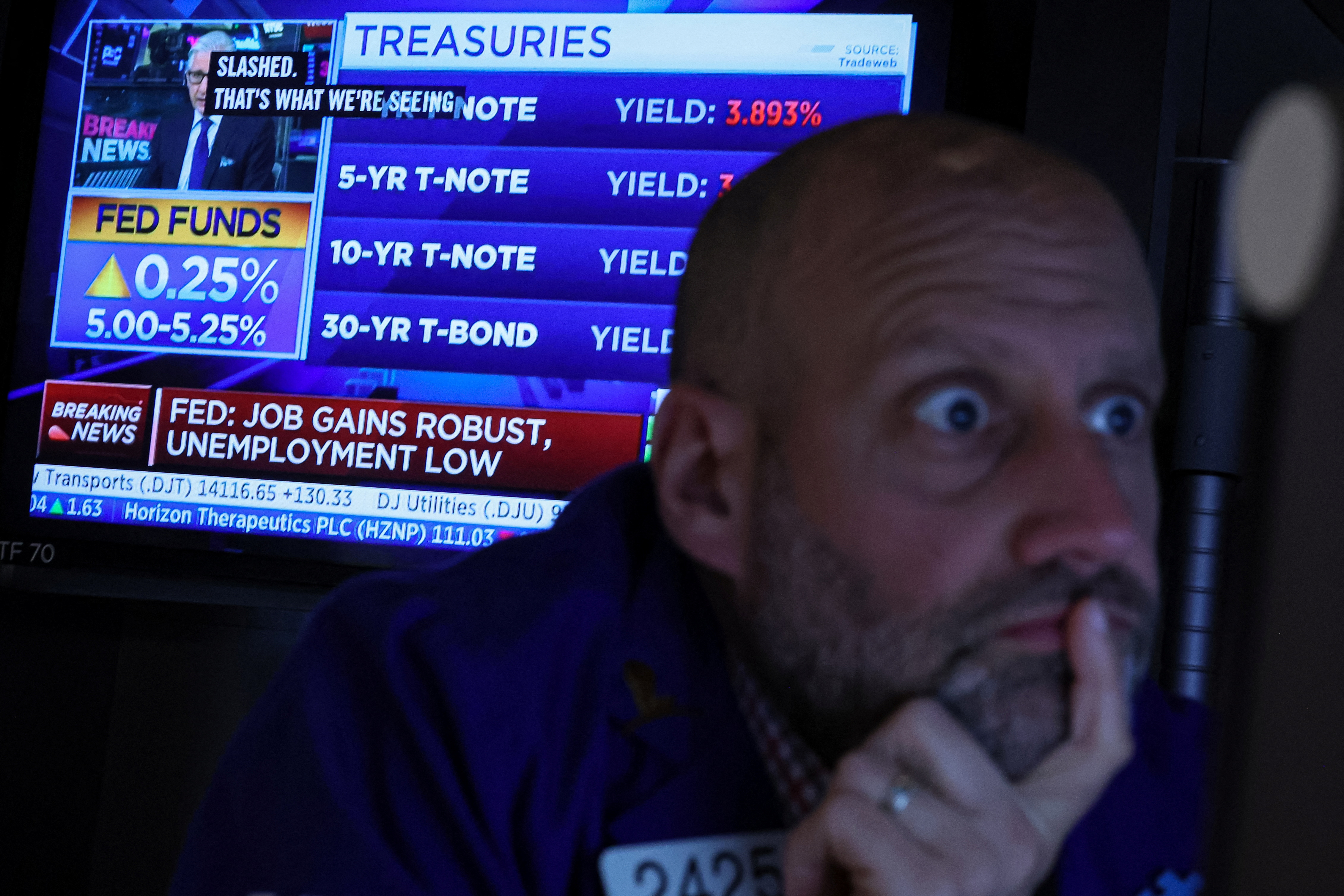U.S. stock indexes fell on Thursday after PacWest’s move to explore strategic options deepened concerns about the health of regional banks, with uncertainty around the path of U.S. interest rates also weighing on the mood. PacWest Bancorp tumbled 49.7% to a record low after confirming it was exploring strategic options, including a sale, after shares of the regional lender and peers got hammered recently on fears of a worsening banking crisis. The Associated Press has the story:
Wall Street Stocks sink as Bank fears flare
Newslooks- NEW YORK (AP)
Stocks are sinking on Wall Street Thursday as worries crank higher about a cracking U.S. banking system. The S&P 500 was 0.5% lower in afternoon trading as several market-moving forces swirled, from the latest rate increase by the European Central Bank to a report indicating more U.S. workers got laid off last week than expected. The Dow Jones Industrial Average was down 288 points, or 0.9%, at 33,126, as of 1:10 p.m. Eastern time, while the Nasdaq composite was 0.2% lower.
Some of the wildest action was in the financial industry, where shares of PacWest Bancorp tumbled 44.5%. It’s been under heavy scrutiny by investors recently following three of the four largest U.S. bank failures in history.
Wall Street has been hunting for other possible weak links in the system, which could see a swift exodus of customer deposits as the industry contends with much higher interest rates. PacWest said overnight that it’s considering its options and that several potential partners and investors have approached it. It also said that its core customer deposits have increased since the end of March.

Fear is running so high in the industry that shares of Western Alliance Bancorp plunged as much as 61% after a report from The Financial Times said the Phoenix-based bank was considering selling its business, among other options. But the company refuted the report, saying there “is not a single element of the article that is true.” Its stock pared its drop to a loss of 29.1%.
The wild movements came after Western Alliance tried to reassure investors late Wednesday with a statement saying its deposits are stable and that they increased from Monday to Tuesday.
First Horizon, meanwhile, dropped nearly 33.5% after it and TD Bank Group agreed to call off their merger deal. TD told First Horizon it did not know when it could get regulatory approvals for the deal.
At the start of this week, regulators seized First Republic Bank and sold most of it to JPMorgan Chase, with hopes that could bolster confidence in the industry. Officials have stressed they see the banking system is sound and secure, but the worries aren’t leaving the market.
Even larger banks were falling Thursday, though not to the same degree as smaller ones. JPMorgan Chases fell 1.5%.
Banks are dealing with drastically different business conditions now that interest rates are no longer at record lows. The Federal Reserve on Wednesday announced its latest increase, which took its key overnight rate up to a range of 5% to 5.25% from virtually zero early last year.
The Fed has jacked up rates at the fastest pace in decades to knock down high inflation. But it does that by slowing the economy, raising the risk of a recession and hurting prices for investments.
The worry now is that even if no more banks topple, the industry’s turmoil could cause smaller and mid-sized banks to pull back on their lending. That in itself could act like rate hikes, which would further smother the economy. Many investors already believe a recession will hit later this year.
A report on Thursday showed that the number of U.S. workers filing for unemployment last week accelerated a bit more than expected. The job market has remained largely resilient, and it’s one of the main pillars still propping up the slowing economy. A more comprehensive report on Friday will give the latest monthly update on the overall job market.
With worries rising about the economy, the Fed indicated Wednesday that it may be done hiking interest rates for the moment. But the European Central Bank on Thursday pressed on. Its president, Christine Lagarde, said that it has “more ground to cover, and we are not pausing.” It did slow the pace of its hikes, raising rates by only a quarter of a percentage point.
Helping to support stocks despite all the worries has been a largely better-than-feared earnings reporting season. Companies in the S&P 500 are still on track to report a second straight quarter of profit drops, but the results have mostly been better than expected.
Ball gained 13.3% after the maker of aluminum cans and other packaging reporting stronger profit than expected. Royal Caribbean rose 8.7% after its results for the latest quarter were better than expected.
Shopify jumped 24.8% after it reported a profit instead of the loss expected by analysts. The e-commerce company also said it’s selling the two biggest pieces of its fulfillment network and abandoning its logistics ambitions.
Coming up after trading ends for the day is the earnings report from Apple. It’s the most influential stock on Wall Street because it’s the biggest, and it’s following a parade of better-than-expected reports from other Big Tech stocks.
Apple fell 0.5% before its report.
Qualcomm was also a heavy weight on the market after it fell 5.6%. It reported stronger results for the latest quarter than expected, but analysts pointed to disappointing guidance for upcoming results.







